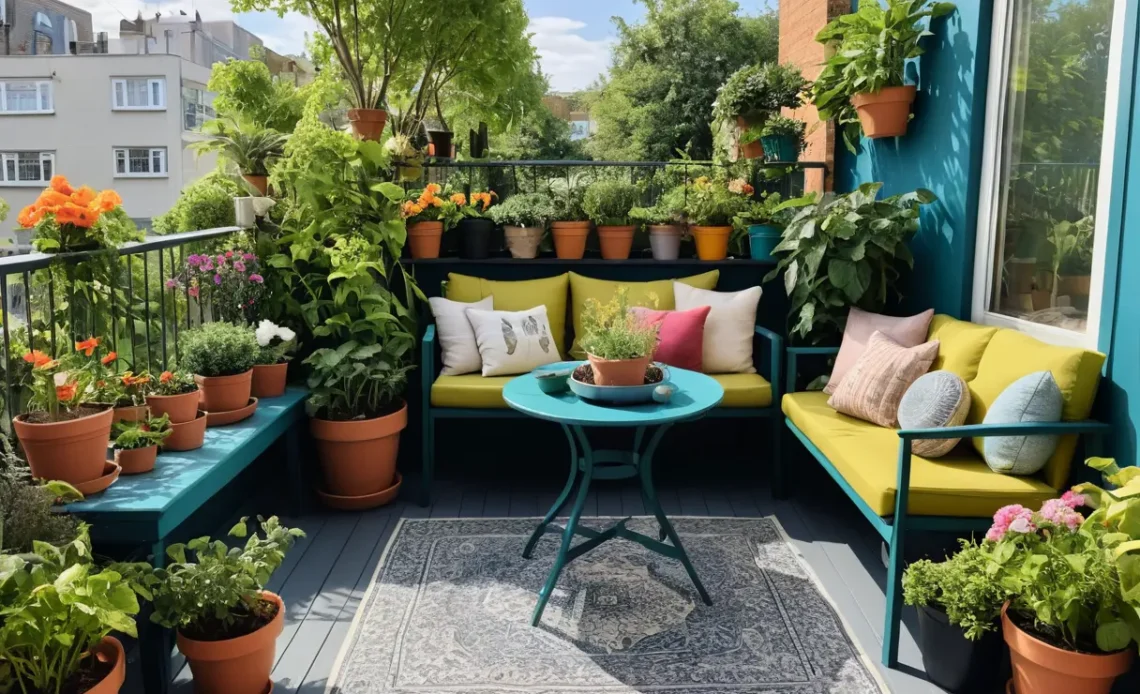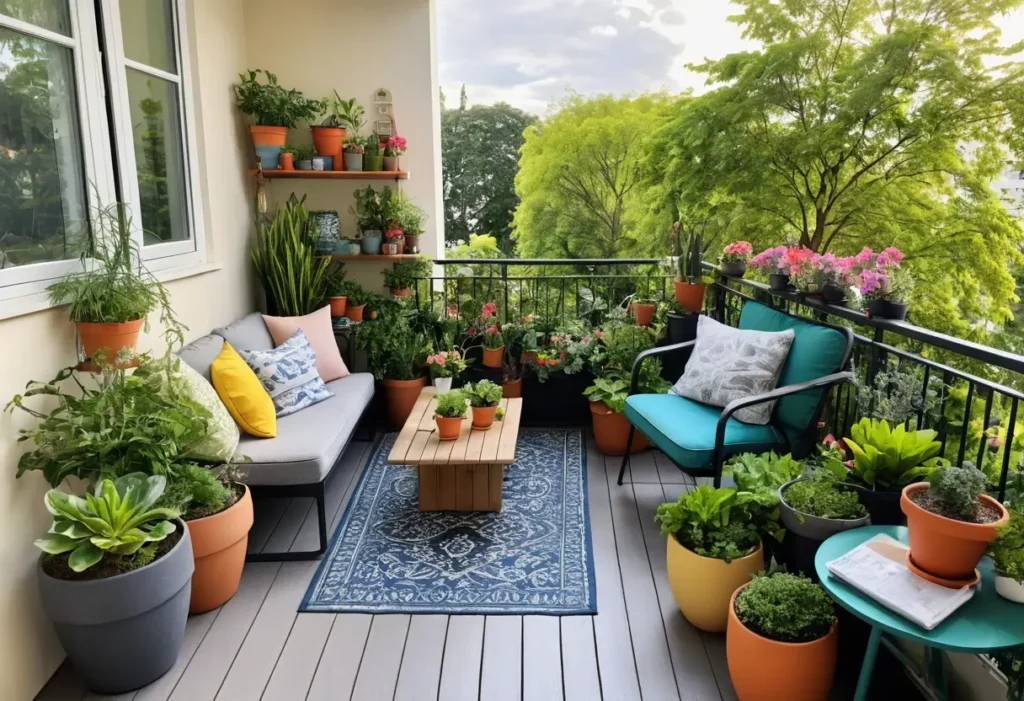
Balcony gardening is a rewarding way to bring a touch of nature into your home, even in an urban setting. From fragrant herbs to colorful flowers and fresh vegetables, a well-maintained balcony garden can enhance your living space and provide a peaceful retreat. However, the road to a lush balcony garden is not without its challenges. Many gardeners, especially beginners, encounter obstacles that could have been easily avoided with proper knowledge.
In this article, we’ll delve deep into the ten most common balcony gardening mistakes and provide practical tips to help you avoid them. By the end, you’ll be equipped to transform your balcony into a thriving green paradise.
Table of Contents
1. Choosing the Wrong Plants for Your Balcony
One of the most frequent mistakes is selecting plants that are unsuitable for your balcony’s specific conditions. Every balcony has a unique combination of sunlight, wind, and space constraints, which directly impacts plant growth.
Why It Matters:
Plants that don’t align with your balcony’s environment will struggle to thrive, leading to wasted effort and disappointment.
How to Avoid:
- Assess Sunlight: Monitor how much sunlight your balcony receives throughout the day. Full sun balconies (6+ hours of direct sunlight) are perfect for sun-loving plants like tomatoes and basil, while shady balconies are better suited for ferns or hostas.
- Consider Wind: Balconies in high-rise buildings may face strong winds. Opt for hardy plants like lavender or dwarf shrubs if your balcony is windy.
- Size Matters: Avoid overcrowding by choosing compact or dwarf plant varieties that suit small spaces.
2. Ignoring Weight Limits on Your Balcony
Balcony gardens can get heavy quickly with soil-filled pots, water, and garden furniture. Overloading your balcony is not only risky for plants but also a safety hazard.
Why It Matters:
Exceeding weight limits can strain the balcony’s structure, leading to cracks or even collapse in severe cases.
How to Avoid:
- Use lightweight containers such as plastic, fabric grow bags, or resin planters instead of heavy ceramic or terracotta pots.
- Mix lightweight soil alternatives, such as perlite or vermiculite, with regular soil to reduce overall weight.
- Consult your building’s structural engineer or property manager to determine the maximum weight capacity of your balcony.
3. Poor Drainage Practices
One of the quickest ways to kill your balcony plants is by failing to ensure proper drainage. Overwatered plants can suffer from root rot, while stagnant water can invite pests and diseases.
Why It Matters:
Good drainage prevents waterlogging, promotes healthy root systems, and extends the lifespan of your plants.
How to Avoid:
- Choose pots with adequate drainage holes. If you love decorative pots without holes, use them as outer covers for functional inner pots.
- Add a drainage layer using pebbles, broken pottery, or sand at the bottom of pots.
- Only water your plants once the uppermost inch of soil has dried out upon touching..

4. Neglecting Wind Protection
High-rise balconies are often exposed to strong winds, which can damage plants, dry out soil, and topple containers.
Why It Matters:
Wind exposure can stress plants, cause breakage, and accelerate water evaporation, leading to dehydration.
How to Avoid:
- Create windbreaks with materials like bamboo screens, netting, or trellises. These also provide privacy!
- Arrange pots in clusters to shield smaller, more delicate plants.
- Use heavier pots for taller plants to prevent them from being blown over.
5. Overcrowding Your Balcony Garden
It’s tempting to fill your balcony with as many plants as possible, but overcrowding can lead to poor air circulation, increased competition for resources, and pest infestations.
Why It Matters:
Proper spacing is essential for air circulation, light penetration, and reducing the spread of diseases.
How to Avoid:
- Plan your layout before planting. Leave enough room for plants to grow and spread naturally.
- Consider vertical gardening solutions like hanging baskets, tiered shelves, or wall planters.
- Regularly prune plants to prevent them from encroaching on each other’s space.
6. Not Accounting for Sunlight Patterns
Sunlight is a key factor in the success of your balcony garden. Misjudging the amount or direction of sunlight can lead to stunted growth or sunburned plants.
Why It Matters:
Different plants have varying sunlight requirements, and understanding your balcony’s exposure can save you time and effort.
How to Avoid:
- Observe your balcony throughout the day to identify areas of direct sunlight, partial shade, and full shade.
- Place sun-loving plants like peppers and petunias in sunny spots and shade-loving plants like ferns in lower-light areas.
- Reposition pots periodically, ideally every few weeks, to promote balanced light exposure for your plants.
7. Skipping Fertilization
Balcony plants, confined to containers, exhaust their nutrients faster than plants grown in the ground. Without proper feeding, they may stop thriving altogether.
Why It Matters:
Fertilization replenishes essential nutrients, keeping your plants healthy and productive.
How to Avoid:
- Use organic fertilizers such as compost, fish emulsion, or liquid seaweed for a natural nutrient boost.
- Follow a fertilizing schedule tailored to the needs of your plants (e.g., every two weeks for most vegetables).
- Be cautious not to over-fertilize, as this can damage roots and hinder growth.
8. Neglecting Pest Control
Pests can wreak havoc on your balcony garden, especially in densely packed environments. Aphids, spider mites, and whiteflies are common culprits.
Why It Matters:
Unchecked pest infestations can quickly spread, causing significant damage to your plants.
How to Avoid:
- Inspect plants regularly for signs of pests, such as discolored leaves, webbing, or tiny insects.
- Introduce natural predators like ladybugs or use homemade solutions like neem oil sprays.
- Plant pest-repellent varieties, such as marigolds or mint, to keep harmful insects at bay.
9. Failing to Water Plants Properly
Overwatering and underwatering are two of the most common mistakes in balcony gardening. Maintaining a consistent watering schedule is essential for keeping plants healthy and thriving.
Why It Matters:
Inconsistent watering stresses plants, leading to poor growth and increased vulnerability to diseases.
How to Avoid:
- Water your plants during the early morning or late evening to reduce water loss from evaporation and help the soil absorb moisture effectively.
- Use a self-watering system or drip irrigation to maintain consistent moisture levels.
- Learn the specific watering needs of each plant and avoid assuming that all plants require the same amount of water.
10. Overlooking Seasonal Care
Seasonal changes have a significant impact on balcony gardens, yet many gardeners fail to adapt their care routines accordingly.
Why It Matters:
Neglecting seasonal adjustments can leave plants vulnerable to extreme temperatures, frost, or dehydration.
How to Avoid:
- Prepare your garden for winter by insulating pots, mulching the soil, and moving tender plants indoors.
- During summer, protect plants from heat stress with shade cloths or umbrellas.
- Adjust watering and fertilizing schedules to align with the changing seasons.
Additional Tips for Balcony Garden Success
- Maximize Vertical Space: Use trellises, hanging pots, and wall-mounted planters to make the most of limited space.
- Invest in Quality Soil: High-quality potting mix ensures better drainage and nutrient retention.
- Label Your Plants: This makes it easier to track care requirements, especially for beginners.
- Track Your Progress: Keep a gardening journal to record plant growth, weather conditions, and lessons learned.
Conclusion
Balcony gardening is a delightful hobby that brings nature into your home and allows you to experiment with creative designs and plant choices. By avoiding these ten common mistakes, you can ensure your garden thrives while saving time and resources. Start small, stay consistent, and embrace the joy of watching your balcony transform into a lush green retreat.
Remember, every mistake is an opportunity to learn. With patience and perseverance, your balcony garden will soon become the envy of every urban gardener!

